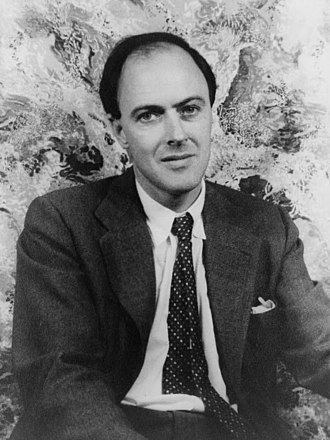Roald Dahl

Roald Dahl[a] (13 September 1916 – 23 November 1990) was a British novelist, short-story writer, poet, screenwriter, and wartime fighter pilot.[1] His books have sold more than 250 million copies worldwide.[2]
Dahl was born in Wales to Norwegian immigrant parents. He served in the Royal Air Force (RAF) during the Second World War. He became a fighter pilot and, subsequently, an intelligence officer, rising to the rank of acting wing commander. He rose to prominence as a writer in the 1940s with works for children and for adults, and he became one of the world’s best-selling authors.[3][4] He has been referred to as “one of the greatest storytellers for children of the 20th century”.[5] His awards for contribution to literature include the 1983 World Fantasy Award for Life Achievement and the British Book Awards’ Children’s Author of the Year in 1990. In 2008, The Times placed Dahl 16th on its list of “The 50 Greatest British Writers Since 1945”.[6] However, he and his work have been criticised for antisemitism, racism and misogyny.
Dahl’s short stories are known for their unexpected endings, and his children’s books for their unsentimental, macabre, often darkly comic mood, featuring villainous adult enemies of the child characters.[7][8] His children’s books champion the kindhearted and feature an underlying warm sentiment.[9][10] His works for children include James and the Giant Peach, Charlie and the Chocolate Factory, Matilda, The Witches, Fantastic Mr Fox, The BFG, The Twits, and George’s Marvellous Medicine. His adult works include Tales of the Unexpected.
Roald Dahl was born in 1916 at Villa Marie, Fairwater Road, in Llandaff, Cardiff, Wales, to Norwegians Harald Dahl (1863–1920) and Sofie Magdalene Dahl (née Hesselberg) (1885–1967).[11][12] Dahl’s father had immigrated to the UK from Sarpsborg in Norway and settled in Cardiff in the 1880s with his first wife, a Frenchwoman named Marie Beaurin-Gresser. They had two children together (Ellen Marguerite and Louis) before her death in 1907.[13] His mother immigrated to the UK and married his father in 1911. Dahl was named after Norwegian polar explorer Roald Amundsen. His first language was Norwegian, which he spoke at home with his parents and his sisters Astri, Alfhild, and Else. The children were raised in Norway’s Lutheran state church, the Church of Norway, and were baptised at the Norwegian Church, Cardiff.[14] His grandmother Ellen Wallace was a descendant of an early 18th-century Scottish immigrant to Norway.[15] Dahl’s father was a wealthy shipbroker who left behind a fortune of £150,000 (about £4.5 million in 2016) when he died in 1920.[16]
Mrs Pratchett’s former sweet shop in Llandaff, Cardiff, has a blue plaque commemorating the mischief played by young Roald Dahl and his friends, who were regular customers.[17]
Dahl’s sister Astri died from appendicitis at age 7 in 1920 when Dahl was 3 years old, and his father died of pneumonia at age 57 several weeks later.[18] Later that year, his youngest sister, Asta, was born.[13] Dahl’s mother decided to remain in Wales instead of returning to Norway to live with relatives, as her husband had wanted their children to be educated in English schools, which he considered the world’s best.[19]
Dahl first attended The Cathedral School, Llandaff. At age eight, he and four of his friends were caned by the headmaster after putting a dead mouse in a jar of gobstoppers at the local sweet shop,[5] which was owned by a “mean and loathsome” old woman named Mrs Pratchett.[5] The five boys named their prank the “Great Mouse Plot of 1924”.[20] Gobstoppers were a favourite sweet among British schoolboys between the two World Wars, and Dahl referred to them in his fictional Everlasting Gobstopper which was featured in Charlie and the Chocolate Factory.[21]
Dahl transferred to St Peter’s boarding school in Weston-super-Mare. His parents had wanted him to be educated at an English public school, and this proved to be the nearest because of the regular ferry link across the Bristol Channel. Dahl’s time at St Peter’s was unpleasant; he was very homesick and wrote to his mother every week but never revealed his unhappiness to her. After her death in 1967, he learned that she had saved every one of his letters;[22] they were broadcast in abridged form as BBC Radio 4’s Book of the Week in 2016 to mark the centenary of his birth.[23] Dahl wrote about his time at St Peter’s in his autobiography Boy: Tales of Childhood.[24]
